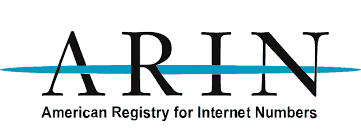Definition of American Registry for Internet Numbers (ARIN) in The Network Encyclopedia.
What is American Registry for Internet Numbers (ARIN)?
ARIN (American Registry for Internet Numbers) is a nonprofit organization that administers the registration of blocks of IP addresses to Internet service providers (ISPs) in those areas previously managed by Internet Network Information Center (InterNIC) via its designated representative Network Solutions, Inc., namely North and South America, the Caribbean, and sub-Saharan Africa.

IP address blocks are usually assigned to large national ISPs who then allocate smaller blocks to regional and metropolitan ISPs, who in turn allocate IP addresses to the networks of their corporate clients and dial-up users. The acronym ARIN stands for American Registry for Internet Numbers.
IP address registration is administered in Europe by the Reseaux IP Europeans (RIPE) and in the Asia Pacific region by the Asia Pacific Network Information Center (APNIC). Two additional Internet Protocol (IP) registries are planned for the continents of Africa and South America.
ARIN History
The formation of the Internet began in the 1960s with the creation of the U. S. Department of Defense’s Advanced Research Project Agency Network (ARPANET). The ARPANET was a way for government researchers to share information. In the 1980s, the National Science Foundation’s (NSF’s) high-speed network, the NSFNET, was created to connect university super computer centers across the U. S. These two network infrastructures formed the backbone of the Internet of today.
During these early days, the administrative task of assigning addresses was handled by one individual, Jon Postel, on a volunteer basis, first at UCLA and later at USC’s Information Sciences Institute (ISI). When the task became administratively prohibitive, the Internet Assigned Names and Numbers Authority (IANA) was established under US Government contract as the “custodian” of Internet addresses, along with the Internet Registry (IR) function to handle these registration tasks as well as other functions.
This IR function was contracted first to USC/ISI and then to SRI International before it was awarded in 1991 to Network Solutions, Inc. (NSI) in Herndon, Virginia. This contract included the services of IP address and domain name registration and support, Autonomous System Number (ASN) registration, user registration, online information services, help desk operations, RFC and Internet-Draft archives, and distribution services.
In 1992, following several years of explosive Internet growth, the U. S. government and the NSF decided that network support for the commercial Internet should be separated from the U. S. Department of Defense. The NSF originated a project named InterNIC in 1993 under a cooperative agreement with NSI to provide registration and allocation of domain names and IP address numbers.
Also in 1992, the Internet technical community, in consultation with various U. S. government entities, recommended that Internet number resources be managed at a regional level due to the growth and globalization of the Internet. As a result, the Regional Internet Registry (RIR) system was formed. ARIN was established in December 1997 to provide IP registration services within its defined region as an independent, nonprofit corporation.
See: